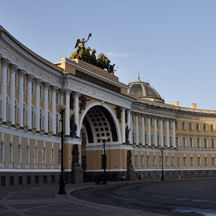
The European Biennial of Contemporary Art
28 June 31 October 2014
St. Petersburg, Russia The State Hermitage Museum
Manifesta Publications
The publications that MANIFESTA produces alongside the Biennial are designed to provide a theoretical context for MANIFESTA 10 as well as general insights into contemporary art production.
MANIFESTA publications over the Biennial period will seek to offer a progressive critical platform for contemporary art thinking and knowledge, and are realized in collaboration with local institutions such as the Faculty of Liberal Arts and Sciences (Smolny College), Saint Petersburg State University, and other local cultural agents.
MANIFESTA 10 Catalogue
Produced in both Russian and English-language editions, the MANIFESTA 10 Catalogue offers insights into the exhibition’s conception and artworks. In response to the location of the Biennial—in which one third of the exhibition is staged in the opulent Winter Palace—it looks at the idea and the possibilities of showing contemporary art in the context of art history. The Catalogue investigates what juxtapositions of new/old and West/East can mean within the context of various aesthetic approaches. Featuring pages on participating artists illustrated in color, the Catalogue provides comprehensive information on the artworks, the public program, and the film program “Unlooped—Kino.” A selection of short essays by philosophers, curators, and art historians such as Christoph Menke, Jürgen Habermas, Helmut Draxler, Joanna Warsza, Ekaterina Andreeva, and Silvia Eiblmayr, highlight aspects of MANIFESTA 10 against the background of current criticism and theory.
MANIFESTA 10 catalogue is published by Walther König, Cologne.
MANIFESTA 10 Pocket Guide
The MANIFESTA 10 Pocket Guide is a handy companion to MANIFESTA 10, providing useful information for visitors to the Biennial. It serves as a practical guide for art professionals, art historians, critics, collectors, curators, and students, as well as for casual visitors. The Pocket Guide consists of accessible texts under various headings including: the exhibition, the public program, the film program, education activities, and parallel events.
It contains useful maps of the city highlighting Biennial venues and points of interest in and around St. Petersburg.
MANIFESTA Journal 18
Manifesta Journal reflects on the processes undergone when a subject is in a state of conditioning, and of subjectivity expressed through creative processes, political acts, and other forms of resilience. Self-censorship, reflections on alternatives such as the commons-based society, and the complex roles of institutions and individual positions are some of the topics discussed in this edition.
Manifesta Journal 18 is edited by Nataša Petrešin-Bachelez (Chief Editor), Moscow/Berlin based artist and curator David Riff (MJ#18 Guest Editor), Lisa Mazza (Associate Editor) and Georgia Taperell (Managing Editor). MJ#18 will be released in July 2014.
MJ#18 follows previous collaborations with guest editors Virginie Bobin (Associate Editor MJ#13-17), Cuauhtémoc Medina (Guest Editor MJ#13), Rasha Salti (Guest Editor MJ#14-16), and Bisi Silva (MJ#17), exploring subjects as broad as chronopolitics, anthropology, memory, regret, amnesia, hybridity and cohabitation.
Every two months, a blogger-in-residence is invited to share his/her research-in-progress as part of the Manifesta Journal Online Residency which can be read on the MJ website.
Manifesta Journal is now available for free online and can be downloaded in PDF format at www.manifestajournal.org
MANIFESTA Journal Online Residencies
Every two months, a curator or writer is invited to share his or her research progress in the form of a blog hosted online by MANIFESTA Journal. In presenting reflections, assessments, and reactions to a specific subject, MANIFESTA Journal online residencies extend the Journal’s inquiry into current practices of reading, researching, publishing, and curating that have been enabled by the internet and its social technologies, while exploring new formats and advocating the open circulation of knowledge. Upcoming residents, the curatorial collective What, How & for Whom / WHW, extend the invitation to artists Lawrence Abu Hamdan and Rajkamal Kahlon, two artists taking part in “Meeting Points 7,” curated by WHW.
Future bloggers include Maria Chehonadskih (May–June, 2014) and Miguel López (July–August, 2014).
The MANIFESTA Journal Reader
The MANIFESTA Journal Reader is a publication compiling over twenty-five articles selected from the previous seventeen issues of the MANIFESTA Journal, translated and published in Russian. The collection of texts, based on the practices and theories of contemporary curating, is edited by Viktor Misiano, critic, curator, and founder/former chief editor of the MANIFESTA Journal, in collaboration with Nataša Petrešin-Bachelez, current MANIFESTA Journal chief editor, and Virginie Bobin, former associate editor.
The body of articles reconsiders the meanings and effects of curatorial practices today, and is structured in two parts: the first focuses on the theoretical foundations of curating and attempts to form a grammar and manual of contemporary curatorship; the second part stages a range of questions that imagine new (geo)political, humanistic, and controversial potentialities.
The Reader tracks the evolution of the curator as a professional figure and the history of curating from 2003—the year that the MANIFESTA Journal was founded under the subtitle “Journal of Contemporary Curatorship”—until the present day, where the focus of the Journal is to look at ideas “Around Curatorial Practices.”
The Reader aims to be a comprehensive textbook for future Russian curators, offering both theoretical and pragmatic articles on contemporary artistic and curatorial practices written by significant international curators and intellectuals, including, among others, Russian thinkers Viktor Mazin, Alexei Penzin, Elena Sorokina, Viktor Misiano, and Boris Groys.
The MANIFESTA Journal Reader is produced in collaboration with the Master of Arts Program in Curatorial Studies at the Saint Petersburg State University Faculty of Liberal Arts and Sciences (Smolny College), a new dual degree MA program that has been developed by Smolny College together with the Center for Curatorial Studies at Bard College (CCS Bard). This Program is committed to enhancing students’ ability to participate in professional activities and to improving their interpretive and critical thinking and writing.
The Reader has been made possible thanks to the generous support of Calvert 22 and their longstanding partnership with Smolny, in their continued support for the Curatorial Studies Program. It will be launched in Saint-Petersburg in October 2014.






